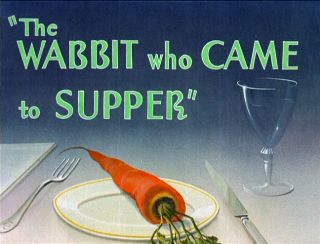- The Wabbit Who Came to Supper
Infobox Hollywood cartoon
cartoon_name = The Wabbit Who Came to Supper
series =Merrie Melodies /Bugs Bunny

caption =
director = I. Freleng
story_artist =Michael Maltese
animator = Richard Bickenbach
Cal Dalton
Gil Turner
Manuel Perez
Gerry Chiniquy
voice_actor =Mel Blanc
Arthur Q. Bryan (uncredited)
producer =Leon Schlesinger
distributor =Warner Bros. Pictures
The Vitaphone Corporation
release_date =March 28 ,1942 (USA)
color_process =Technicolor
runtime = 8 min (one reel)
movie_language = English
imdb_id = 0035527"The Wabbit Who Came to Supper" is a 1942
Warner Brothers "Merrie Melodies " cartoon featuring early appearances byBugs Bunny andElmer Fudd . The Elmer character is in a transitional state from his earliest appearances inBob Clampett 's shorts and the appearance which he adopted around 1943.This short is one of several pre-1948 WB cartoon shorts that lapsed into the
public domain due toUnited Artists failing to renew the copyright in time.Crew
Friz Freleng , the man most responsible for developing Bugs' personality, was the director of this short. This short was written byMichael Maltese and animated by Richard Bickenbach. The music was selected, composed and arranged byCarl W. Stalling with sound effects and editing byTreg Brown .Mel Blanc performed all the voices, except for Elmer, who was voiced byArthur Q. Bryan .The title of the short is a reference to the 1942 Warner Brothers film version of the
George S. Kaufman comedy "The Man Who Came to Dinner ", in which an overbearing house-guest threatens to take over the lives of a small-town family.Plot synopsis
While out on the hunt for rabbits, Elmer receives a telegram from "Eastern Union" saying his Uncle Louie will leave him $3 million in his will, as long as he doesn't harm any animals — especially rabbits. "We're in the Money" plays in the underscore. Elmer, with his rounded-L's-and-R's speech impediment, of course cannot pronounce "Uncle Louie" correctly; which sounds more like "Uncoh Wooie".
Bugs, with characteristic élan, takes full advantage of the situation by moving in with Elmer.
As he showers and shaves, Bugs sings "Angel in Disguise", from the 1940 Warner Brothers film "
It All Came True " (which, like "The Man Who Came to Dinner", starredAnn Sheridan ).Elmer tries to coax Bugs into leaving, gently patting him on the head, which Bugs says is terribly hurting him. Bugs references a running gag from the radio show
Fibber McGee and Molly when he threatens to call Uncle Louie: "Operator, give me Walnut three three fifty-. . ., Ohhh, that you, Myrt? How's every little thing?" (Arthur Q. Bryan, the voice of Elmer Fudd, also played "Doc Gamble" on the Fibber McGee show.)After fulfilling the stipulations of the will, and suffering all manner of hijinks from Bugs, Elmer gets a letter from his uncle's lawyers showing that, after taxes and fees, he owes "them" $1.98 on the $3 million inheritance ("pwease wemit") ("Actually, according to the deductions listed in the letter, Elmer is left with a balance of $902,934.04"). Elmer is then free to vent his anger on Bugs, and a chase ensues.
Availability
Being in the public domain, "The Wabbit Who Came to Supper" was featured on several low-budget VHS releases of public domain cartoons.
On the 2005 "" DVD release, "The Wabbit Who Came to Supper" is presented in a restored unedited version with a commentary track provided by animation historian
Jerry Beck and Warner Brothers' inkerMartha Sigall , one of about 40 uncredited inkers and painters who labored on the Looney Tunes shorts.Trivia
"The Wabbit that came to Supper" was shown playing on a tv in the backgrund in "
Monkey Trouble ".The
July calendar depicted to debunk Bugs' celebration of the new year would not have been current for1942 , when July began on aWednesday . July began on aSunday in1928 ,1934 , and1945 .External links
*
Wikimedia Foundation. 2010.
